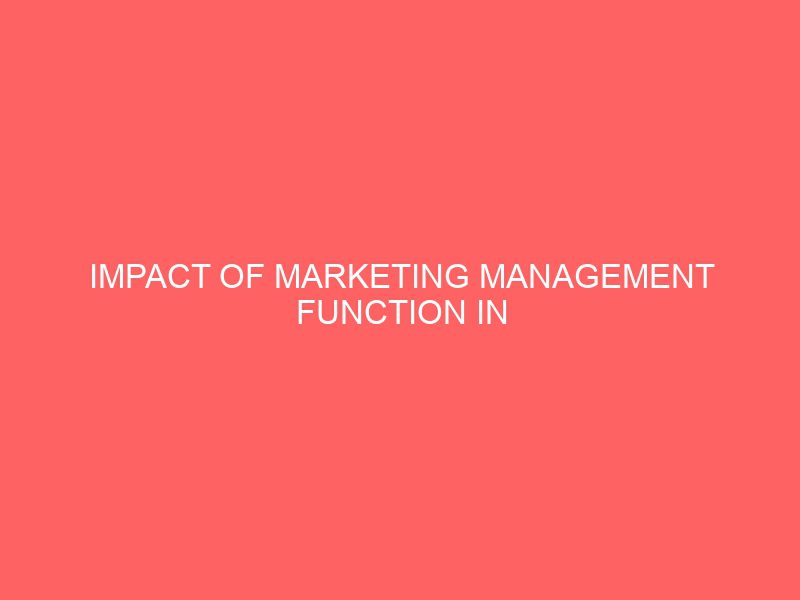Description
CHAPTER ONE
INTRODUCTION
Marketing management is the organizational discipline which focuses on the practical application of marketing orientation, techniques and methods inside enterprises and organizations and on the management of a firms marketing resources and activities. Globalization has led some firms to market beyond the borders of their home countries, making international marketing a part of those firms marketing strategy. Marketing managers are often responsible for influencing the level, timing, and composition of customer demand. In part, this is because the role of a marketing manager or sometimes called managing marketer in small and medium sized enterprises can vary significantly based on a businesss size, corporate culture, and industry context. For example, in small and medium sized enterprises, the managing marketer may contribute in both managerial and marketing operations roles for the company brands. In a large consumer products company, the marketing manager may act as the over all general manager of his or her assigned product. To create an effective, cost efficient marketing management strategy, firms must possess a detailed, objective understanding of their own business and the market in which they operate. In analysing these issues, the discipline of marketing management often overlaps with the related discipline of strategic planning. Marketing management employs various tools from economics and competitive strategy to analyse the industry context in which the firm operates. These include Porters five forces, analysis of strategic group sof competitors, value chain analysis and others. Depending on the industry, the regulatory context may also be important to examine in detail. In competitor analysis, marketers build detailed profiles of each competitor in the market, focusing especially on their relative competitive strengths and weaknesses using SWOT analysis. Marketing managers will examine each competitors cost structure, sources of profits, resources and competencies, competitive positioning and product differentiation, degree of vertical integration, historical responses to industry developments, and other factors. Marketing management often finds it necessary to invest in research to collect the data required to perform accurate marketing analysis. As such, they often conduct market research and marketing research to obtain this information. Marketers employ a variety of techniques to conduct market research, but some of the more common include: Qualitative marketing research, such as focus groups and various types of interviews Quantitative marketing research, such as statistical surveys Experimental techniques such as test markets Observational techniques such as ethnographic onsite observation Marketing managers may also design and oversee various environmental scanning and competitive intelligence processes to help identify trends and inform the company’s marketing analysis. A brand audit is a thorough examination of a brands current position in an industry compared to its competitors and the examination of its effectiveness. When it comes to brand auditing, five questions should be carefully examined and assessed. These five questions are how well the business current brand strategy is working, what are the company’s established resource strengths and weaknesses, what are its external opportunities and threats, how competitive are the business prices and costs, how strong is the business competitive position in comparison to its competitors, and what strategic issues are facing the business. Generally, when a business is conducting a brand audit, the main goal is to uncover business resource strengths, deficiencies, best market opportunities, outside threats, future profitability, and its competitive standing in comparison to existing competitors. A brand audit establishes the strategic elements needed to improve brand position and competitive capabilities within the industry. Once a brand is audited, any business that ends up with a strong financial performance and market position is more likely than not to have a properly conceived and effectively executed brand strategy. A brand audit examines whether a business share of the market is increasing, decreasing, or stable. It determines if the company’s margin of profit is improving, decreasing, and how much it is in comparison to the profit margin of established competitors. Additionally, a brand audit investigates trends in a business net profits, the return on existing investments, and its established economic value. It determines whether or not the business entire financial strength and credit rating is improving or getting worse. This kind of audit also assesses a business image and reputation with its customers. Furthermore, a brand audit seeks to determine whether or not a business is perceived as an industry leader in technology, offering product or service innovations, along with exceptional customer service, among other relevant issues that customers use to decide on a brand of preference. A brand audit usually focuses on a business strengths and resource capabilities because these are the elements that enhance its competitiveness. A business competitive strengths can exist in several forms. Some of these forms include skilled or pertinent expertise, valuable physical assets, valuable human assets, valuable organizational assets, valuable intangible assets, competitive capabilities, achievements and attributes that position the business into a competitive advantage, and alliances or cooperative ventures. The basic concept of a brand audit is to determine whether a business resource strengths are competitive assets or competitive liabilities. This type of audit seeks to ensure that a business maintains a distinctive competence that allows it to build and reinforce its competitive advantage. what’s more, a successful brand audit seeks to establish what a business capitalizes on best, its level of expertise, resource strengths, and strongest competitive capabilities, while aiming to identify a business position and future performance.








Reviews
There are no reviews yet.